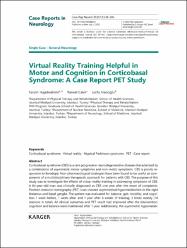| dc.contributor.author | Hajebrahimi, Farzin | |
| dc.contributor.author | Çakır, Tansel | |
| dc.contributor.author | Hanoğlu, Lütfü | |
| dc.date.accessioned | 2020-10-12T06:25:42Z | |
| dc.date.available | 2020-10-12T06:25:42Z | |
| dc.date.issued | 2020 | en_US |
| dc.identifier.citation | Hajebrahimi, F., Çakır, T. ve Hanoğlu, L. (2020). Virtual reality training helpful in motor and cognition in corticobasal syndrome: A case report PET study. Case Reports in Neurology, 12(2), 238-246. https://dx.doi.org/10.1159/000508492 | en_US |
| dc.identifier.issn | 1662-680X | |
| dc.identifier.uri | https://dx.doi.org/10.1159/000508492 | |
| dc.identifier.uri | https://hdl.handle.net/20.500.12511/5906 | |
| dc.description.abstract | Corticobasal syndrome (CBS) is a rare progressive neurodegenerative disease characterized by a combination of asymmetric motor symptoms and non-motor symptoms. CBS is poorly responsive to levodopa. Non-pharmacological strategies have been found to be useful as components of a multidisciplinary therapeutic approach for patients with CBS. The purpose of this study was to investigate the effects of virtual reality training in addressing symptoms of CBS. A 64-year-old man was clinically diagnosed as CBS one year after the onset of complaints. Positron emission tomography (PET) scan showed asymmetrical hypometabolism in the right thalamus and basal ganglia. The patient was evaluated for balance, gait, mobility, and cognition 1 week before, 1 week after, and 1 year after 6 weeks of training, 3 times weekly (18 sessions in total). All clinical outcomes and PET result had improved after the intervention; cognition and balance were maintained after 1 year. Additionally, the asymmetric hypometabolism, which had been detectable on the PET scan, became normal, and a relative improvement was noted in the visual evaluation of cortical involvement. Virtual reality may address different aspects of motor and cognition and possibly brain metabolic changes that can affect the course of the disease in patients with CBS. | en_US |
| dc.language.iso | eng | en_US |
| dc.publisher | Karger | en_US |
| dc.rights | info:eu-repo/semantics/openAccess | en_US |
| dc.rights | Attribution-NonCommercial 4.0 International | * |
| dc.rights.uri | https://creativecommons.org/licenses/by-nc/4.0/ | * |
| dc.subject | Corticobasal Syndrome | en_US |
| dc.subject | Virtual Reality | en_US |
| dc.subject | Atypical Parkinson Syndrome | en_US |
| dc.subject | PET | en_US |
| dc.subject | Case Report | en_US |
| dc.title | Virtual reality training helpful in motor and cognition in corticobasal syndrome: A case report PET study | en_US |
| dc.type | article | en_US |
| dc.relation.ispartof | Case Reports in Neurology | en_US |
| dc.department | İstanbul Medipol Üniversitesi, Sağlık Bilimleri Fakültesi, Fizyoterapi ve Rehabilitasyon Bölümü | en_US |
| dc.department | İstanbul Medipol Üniversitesi, Tıp Fakültesi, Dahili Tıp Bilimleri Bölümü, Nükleer Tıp Ana Bilim Dalı | en_US |
| dc.department | İstanbul Medipol Üniversitesi, Tıp Fakültesi, Dahili Tıp Bilimleri Bölümü, Nöroloji Ana Bilim Dalı | en_US |
| dc.authorid | 0000-0002-5286-4981 | en_US |
| dc.authorid | 0000-0002-7685-2766 | en_US |
| dc.authorid | 0000-0003-4292-5717 | en_US |
| dc.identifier.volume | 12 | en_US |
| dc.identifier.issue | 2 | en_US |
| dc.identifier.startpage | 238 | en_US |
| dc.identifier.endpage | 246 | en_US |
| dc.relation.publicationcategory | Makale - Uluslararası Hakemli Dergi - Kurum Öğretim Elemanı | en_US |
| dc.identifier.doi | 10.1159/000508492 | en_US |
| dc.identifier.scopusquality | Q4 | en_US |



















